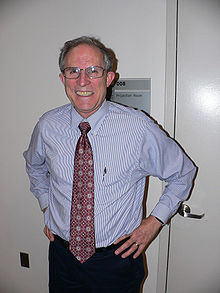- David H. Bailey
-
For other people named David Bailey, see David Bailey (disambiguation).
David Harold Bailey (born 1948) is a mathematician and computer scientist. He received his B.S. in mathematics from Brigham Young University in 1972 and his Ph.D. in mathematics from Stanford University in 1976.[1] He worked for 14 years as a computer scientist at NASA Ames Research Center, but since 1998 has been at the Lawrence Berkeley National Laboratory.
Bailey is perhaps best known as a co-author (with Peter Borwein and Simon Plouffe) of a 1997 paper that presented a new formula for π (pi). This Bailey–Borwein–Plouffe formula permits one to calculate binary or hexadecimal digits of pi beginning at an arbitrary position, by means of a simple algorithm. The formula was discovered by Simon Plouffe using a computer program written by Bailey. More recently (2001 and 2002), Bailey and Richard Crandall showed that the existence of this and similar formulas has implications for the long-standing question of "normality" – whether and why the digits of certain mathematical constants (including pi) appear "random" in a particular sense.
Bailey is a long-time collaborator with Jonathan Borwein (Peter's brother). They are co-authors of numerous papers and three books on experimental mathematics.
Bailey also does research in numerical analysis and parallel computing. He has published studies on the fast Fourier transform, high-precision arithmetic, and the PSLQ algorithm (used for integer relation detection). He is a co-author of the NAS Benchmarks, which are used to assess and analyze the performance of parallel scientific computers. He currently is a co-leader (with Robert Lucas of ISI/USC) of the Sustained Performance, Energy and Resilience (SUPER) Institute, a research consortium to study high-end computer performance, funded by the SciDAC program of the U.S. Department of Energy.
Bailey is a recipient of the Sidney Fernbach award from the IEEE Computer Society, as well as the Chauvenet Prize and the Hasse Prize from the Mathematical Association of America. In 2005 he was a finalist for the $100,000 Edge of Computation Science Prize. In 2008 he was a co-recipient of the Gordon Bell Prize from the Association of Computing Machinery.
In addition to Bailey's technical work in mathematics and computer science, Bailey has written articles on science and religion, emphasizing that the modern theories of geology, biology, physics, astronomy and cosmology must be taken seriously in forming a religious worldview. In particular, he has argued that much of the “creationist” and “intelligent design” literature is not sound scientifically, and in any event is not recommended for those seeking harmony between science and religion. Bailey is the editor of the Science Meets Religion website, a repository of articles and information on issues at the juncture of science and religion. Bailey is affiliated with The Church of Jesus Christ of Latter-day Saints.[2]
See also
- Bailey-Borwein-Plouffe formula
- Experimental mathematics
- Pi
References
External links
Categories:- 20th-century mathematicians
- 21st-century mathematicians
- Brigham Young University alumni
- Stanford University alumni
- American Latter Day Saints
- Living people
- Mormon studies
- 1948 births
Wikimedia Foundation. 2010.

